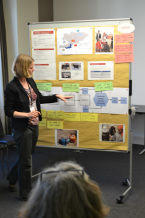 SME Development Project “Bai Alai”, Kyrgyzstan
SME Development Project “Bai Alai”, Kyrgyzstan
Market stall owners: Elke Oehme (Program Manager) and Lydia Plüss (Implementing agency Helvetas Swiss Intercooperation)
 The “BAI ALAI” – Small Business and Income Creation Project is a ten-year initiative, that has started its First Phase in May 2014 in an area with a total population of about 100’000 and with a budget of approximately CHF 6,7 million. Primary beneficiaries and right – holders are all 24’000 households in Alai and Chon Alai, in particular women and young men.
The “BAI ALAI” – Small Business and Income Creation Project is a ten-year initiative, that has started its First Phase in May 2014 in an area with a total population of about 100’000 and with a budget of approximately CHF 6,7 million. Primary beneficiaries and right – holders are all 24’000 households in Alai and Chon Alai, in particular women and young men.
The development goal of the programme is to reduce poverty in Alai and Chon Alai through increased income and employment – in particular for women and youth. This will be achieved by facilitating the rise of local and regional markets, leading to reduced inequalities and improved perception of life perspectives, especially local youth. Bai Alai focuses on following sub-sectors: livestock (cattle), cashmere, poultry for egg production, youth-oriented or women-led businesses, machinery services and tourism. The strategy is to increase productivity, sales and/or margins of the micro and small businesses in these sub-sectors and to create better access to knowledge, information, inputs and new technologies.
 The market stall presentation will focus on a cashmere value chain and highlight collaboration with two new private companies that are interested in buying better quality cashmere. These companies invested their capital to raise farmers knowledge on cashmere (support farmer trainings and provide tools for combing, offer differentiate price for different quality). At the same time there are other companies (mainly Chinese) which are working in cashmere sector, but they are not yet interested in cashmerequality and do not ready to pay differentiated prices.
The market stall presentation will focus on a cashmere value chain and highlight collaboration with two new private companies that are interested in buying better quality cashmere. These companies invested their capital to raise farmers knowledge on cashmere (support farmer trainings and provide tools for combing, offer differentiate price for different quality). At the same time there are other companies (mainly Chinese) which are working in cashmere sector, but they are not yet interested in cashmerequality and do not ready to pay differentiated prices.
Participants could learn on cashmere value chain development in one of the Central Asian countries and challenges faced by the project on each stage of value chain as well as challenges related to the project M4P approach which is an absolutely new approach to these regions.
Here a short video summary by Lydia Plüss:
